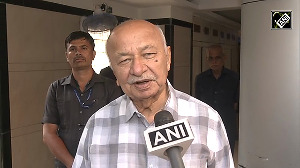 Sorting out differences, a Group of Ministers on Wednesday night recommended lowering of age of consent for sex from 18 to 16 years and suggested stern punishment for offences like stalking.
Sorting out differences, a Group of Ministers on Wednesday night recommended lowering of age of consent for sex from 18 to 16 years and suggested stern punishment for offences like stalking.
Working speedily, the GoM completed its task in the second meeting, paving the way for consideration of the Criminal Laws (Amendment) Bill by the Union Cabinet on Thursday.
The age of consent for sex was one of the highly contentious provisions in the bill, because of which it was referred by the Cabinet to the GoM on Tuesday.
"We have gone through every provision of the proposed bill and all issues have been resolved. Now the matter will go to Cabinet tomorrow and hopefully it will be passed tomorrow," Telecom Minister Kapil Sibal told reporters.
At Wednesday's GoM meeting, there was consensus on lowering the age from 18 to 16 years, subject to approval by Parliament.
Women and Child Development Minister Krishna Tirath had been opposing any move to lower the age of consent.
The GoM, chaired by Finance Minister P Chidambaram, also recommended that sustained stalking be made a non-bailable offence while first offence of voyeurism could be a bailable offence, sources said.
Repeat offences of voyeurisn, inappropriate touch, gesture and remarks have been recommended as non-bailable offences, they said.
The GoM also decided to retain the term 'rape' in the bill and treat it gender-specific, instead of the proposal to make it gender-neutral.
Provisions seeking strong action against those filing false complaints were dropped from the draft Bill, the sources said adding that there was consensus in the GoM that existing laws were adequate for dealing with such cases and it was only a matter of enforcing them.
The bill will replace Criminal Laws Ordinance promulgated on February 3 in the wake of public outrage over the December 16 Delhi gang rape.
The ordinance has to be approved by Parliament before its recess from March 22, failing which it would lapse on April 4.
The GoM was also not in favour of replacing the word 'rape' with 'sexual assault' as proposed in the bill, the sources said.
It also decided to make rape gender-specific, meaning that it could be only against a woman, they said.
Offences such as sodomy can be addressed by the Protection of Children from Sexual Offences Act.
Refusing to give details, Sibal said, "there are no differences of opinion".
The GoM was set up in view of persisting differences among ministers on its provisions at the meeting of the Union Cabinet on Tuesday.
However, considering the urgency of the matter, the GoM was asked to submit its report tonight so that the bill could be brought before the Cabinet tomorrow.
On the issue of stalking and voyeurism, some ministers were of the view that the provisions would be "prone to misuse" and should only be incorporated after putting in place sufficient safeguards, including harsh penalty for lodging false cases.
Stalking and voyeurism were for the first time defined as criminal offences in the ordinance.
Some parties like the Samajwadi Party have serious reservations on certain provisions of the ordinance claiming they are prone to misuse.
Lengthy inter-ministerial consultations had taken place on the issue of lowering of the age of consent from 18 years to 16 with the Women and Child Development Ministry strongly opposing the move.
The bill retains a key provision of the ordinance under which if rape leads to death of the victim or leaves her in a vegetative state, it can also attract death penalty. The minimum punishment is 20 years in jail which may extend upto the "natural life" of the convict.
Illustration: Uttam Ghosh










 © 2025
© 2025